A lemon-caster sugar topped galette de Pérouges
Some call in armchair travel. I, on the other hand, think ‘travelling by plate’ or ‘belly travel’ is far more endearing, more involved, more inclusive and accessible, more embracing…of history, culture, cuisine, people. Through cookbooks, dining in cultural spaces, Food TV channels, street conversations, and more.
This time my stomach’s compass points to France, the dial swinging around to the quaint, hilltop, cobble-stoned village of ‘Pérouges’. Pronounced ‘pay roojh’. Pérouges has been declared by the French government as “one of the most beautiful villages in France.”
My tour guide today is page 25 of ‘French Tarts’, a beautiful book published in the early 1980s through the determination and passion of one strong British lady, Jo Parfitt. More on the book later.
The galets (streets) of Pérouges are paved with aged, water-sculpted stones collected from nearby rivers, shaping and colouring all of the town’s stonework.
But it’s the town’s culinary specialty – the galette de Pérouges that takes me there. A large doughy pastry dripping in sugar, butter and sometimes served with cream, and fresh berry syrup – one that is now a staple at our table.
In Pérouges, Cerdon wine and cider are often drunk to wash down the sweet bread. At home in Nigeria, it is freshly-made mint tea that is our beverage of choice.
The famous Galette Pérougienne (or Galette de Pérouges) was created by Marie-Louise Thibaut in 1912 when she settled in the village of her husband. At that time, Pérouges was an abandoned village, facing the ravages of demolition. Through the efforts of Marie-Louise’s husband, and others, a defense commission was set up to protect the city and ensure that those who come for the first time want to return!
In the spring and summer, Pérouges lures day-trippers. They flock to stroll in its cobbled alleys, admire its half-timbered stone houses, ogle at the weary old liberty tree planted in 1792 on place de la Halle and wolf down galettes de Pérouges.
James Beard felt this galette (Beard on Food, Knopf, 1974) had “all the virtues of French country cooking—it is simple, inexpensive, and makes thoroughly delicious eating.”
I wonder what it would be like to feel the sun beat down my back and hard stone caressing my feet…in Pérouges. Biting into the warm dough, and lulled into a trance by the fragrant citrus sugar top that makes my mouth sing and dance. The contrast in textures as I admire centuries of masonry with a brown, woven sunhat on my head, eyes shaded by the wide lenses of dark brown sunglasses and a flowery sun dress, having the produit du terroir, en place in Pérouges.
But alas, my kitchen walls are the ‘cobbled walls’ of the village, my oven the ‘street’ seller’s. When the warm bread emerges from baking, the bottom has a crust that any artisan baker would be proud of, and the top is almost bruleé-like.
I’ve grilled it till golden. The contrast in textures is exciting – firm base, soft inner and crunchy top. I like. Very much. As do my children. My daughter asks me, ‘Mama is galette de Perouges bread, cake or a a tart?’ And I say ‘Yes, it is all of them’.
I am going to enjoy this recipe for years to come.
In the 80s, Jo Parfitt (then Jo Gosling) studied in Normandy and fell in love with their cakes and bakes. You know what she did? She wrote a cookbook, without making a single recipe! She lived in a small house with limited kitchen facilities so she went round all her friends in the village and promised them a spot in her book if they would contribute a recipe. The school teacher, the nurse, the baker, the farmer….they all brought forth their favourite recipes and the book was done.
With courage, Jo bought a publisher’s handbook, selected a publisher and before you knew it, she had a book deal with Octopus books! Did I mention that she didn’t cook a single recipe but spent time with friends recording their recipes and putting it all together?
Fast forward 20 years on and Jo and I are friends who met in the Netherlands. She’s a gifted writer and publisher, with a focus on expatriate stories, both fiction and non-fiction.
In 2013, Jo will update and publish a new version on French Tarts. I will photograph the recipes. Can you imagine that? Me, a professional photographer in the making…..
I am so thrilled to get the chance to work on a skill I want to develop further. But that’s not all. Some of my recipes will also be included in French Tarts!
I am totally bowled over.
So ladies and gentlemen, the next few months will be full of delicious tarts as I eat and photograph and work hard.
Till then, here is the recipe for Galette de Pérouges, enjoy it.
Galette de Pérouges, adapted from French Tarts by Jo Gosling
200g plain/ all-purpose flour Pinch of salt 75g unsalted butter, softened 1 scant teaspoon instant yeast 1 egg, beaten Finely grated zest of 1 lemon 1/4 cup sugar, plus extra to top 1/4 – 1/2 cup warm water, plus extra 1 tablespoon unsalted butter, softened Sugar, to top Optional: extra lemon zest, to topTips
- You could use any enriched bread dough as the base for this recipe
- You could use orange or mandarin zest instead of the lemon zest
- You can add extra zest to the topping sugar, to strengthen the citrus flavours
- Caster sugar can be used instead of the confectioners’ (icing) sugar
Method
Combine the flour, sugar and salt in bowl, and the softened butter and combine with your finger tips. Add the yeast, the egg and lemon zest and beat together, gradually adding the warm water till the dough comes together. You may not need all of it.
Knead the dough thoroughly until it comes cleanly away from the sides of the bowl. Cover the bowl with a damp cloth and leave to prove in a warm place for 1 ½ – 2 hours or until doubled in size.
Alternatively, mix dough together till there are no flour patches, skip the kneading and leave to refrigerate overnight. Let come to room temperature before the next step.
Once the dough is ready, lightly flour your work surface and lay out the dough. Using the palms of your hands or a rolling pin, roll out the dough into a 25cm/10 inch circle. Place on a lightly greased and floured baking sheet and fold over a 2.5cm/1 inch lip all the way round the edge. Gently spread the tablespoon of butter over the top and let rest for fifteen (15) minutes.
While the dough is rising, pre-heat the oven to 180 degrees Centigrade.
Here you have two choices – use plain sugar or make a citrus sugar by rubbing some lemon zest into caster sugar. Sprinkle the top of the dough with the sugar and place in the middle of the pre-heated oven.
Bake till the edges are golden, ten to fifteen minutes and the galette is cooked.
Remove from the oven and let rest for five to ten minutes. Some like it barely cooked and soft, others prefer it firm and crispy. You choose – either way, serve it warm. Cold. Enjoy.
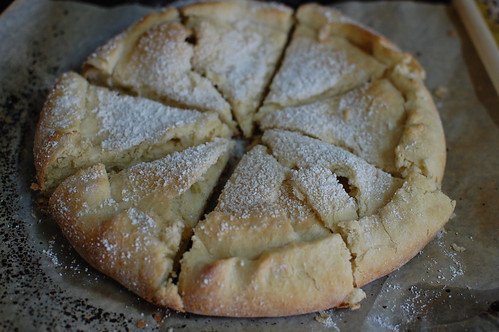
Other links you might be interested in:
- My Kugelhopf’s visit to Pérouges
- Mark Bittman’s version of the Galette de Pérouges in the NY Times
- The official website of Pérouges
And finally, here is a declaration of my love of all things French. See the photo below? That was taken on my very first visit to Paris in 1999, when I was a university student! Those fingers haven’t stopped pointing at delicious things to eat!
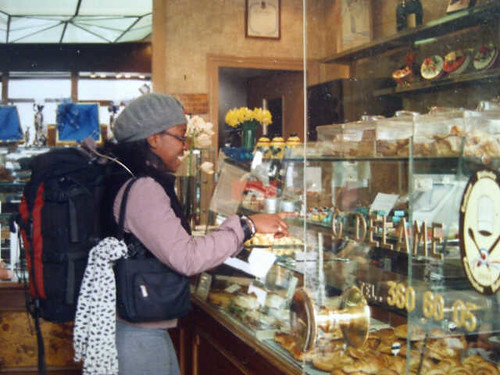



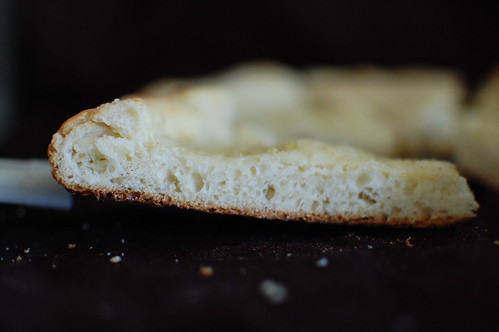

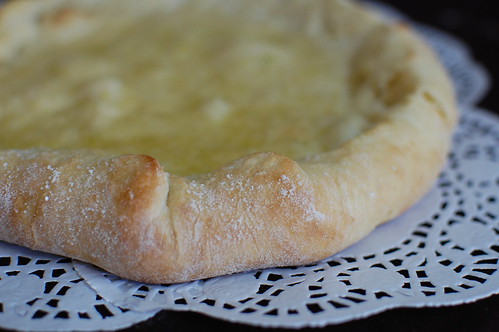


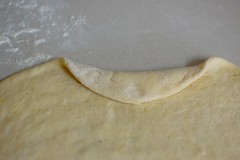




Leave a Reply